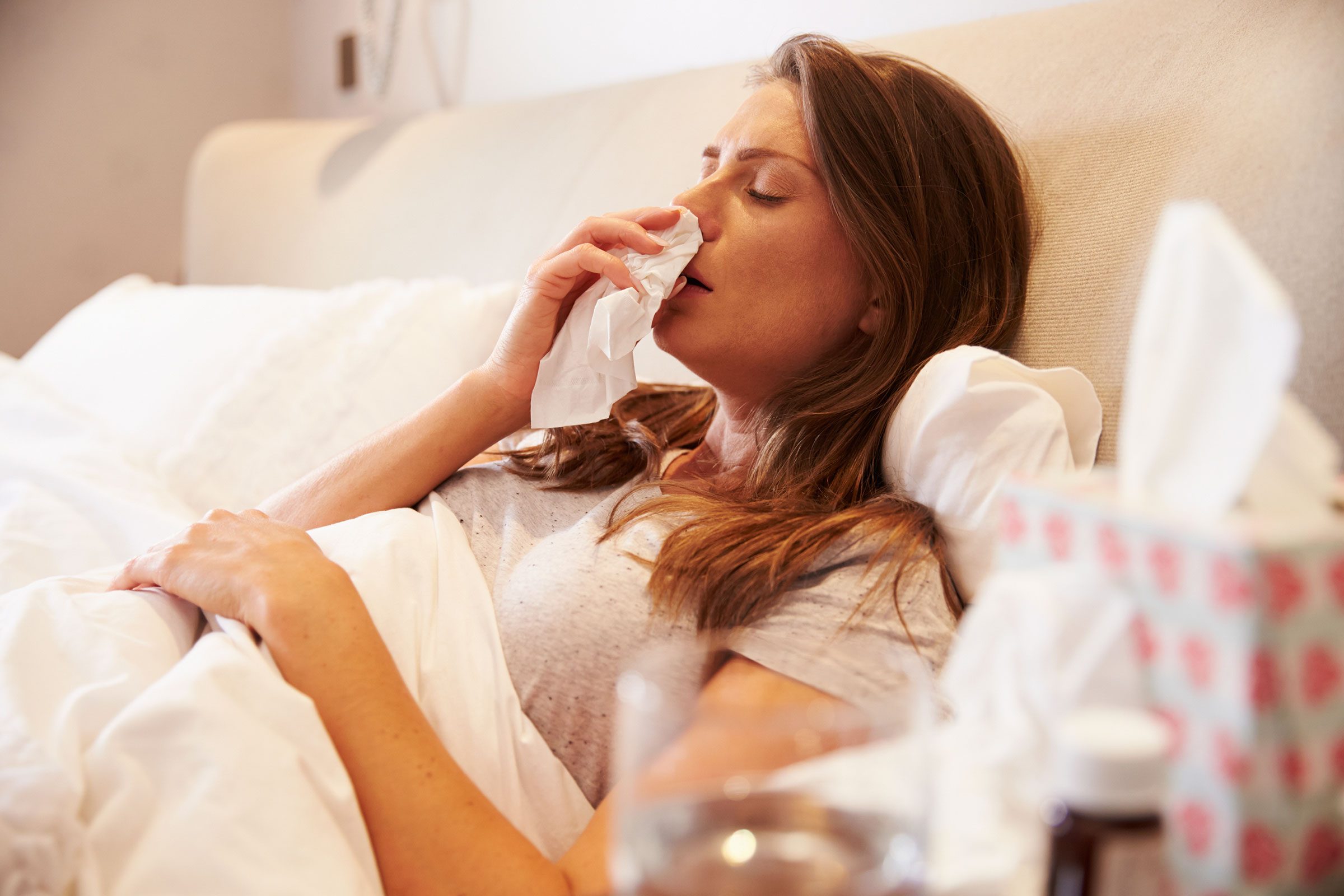
You catch every cold that goes around
Dread cold and flu season because it feels like open season on your poor body? Vitamin deficiencies from eating a poor diet can make you vulnerable to every germ going around says Pam Schoenfeld, MS, a registered dietitian. “Vitamins A, B6, and C, and zinc are needed to support the immune system. Too many people avoid rich sources of these minerals, which include beef, shellfish, liver, and whole eggs, out of the misguided belief that they are fattening or bad for you.” She adds that not eating fresh fruits and vegetables every day also hurts your immune system. Read the 12 everyday habits that boost your immune system.

You’re forgetful
Brain fog shouldn’t be standard operating procedure and what you eat may be prematurely aging your brain. “The brain accounts for only two percent of overall body weight but it uses more than 20 percent of the body’s daily energy intake,” says Vernon Williams, MD, a sports neurologist and director of the Center for Sports Neurology & Pain Medicine at Kerlan-Jobe Orthopaedic Clinic in Los Angeles. “The foods we eat significantly impact how the brain functions, especially over time,” he says. The more packaged food and junk food you eat, the more forgetful you’re likely to be. It doesn’t even take long for the effects to set in, Dr. Williams says, pointing to one study that found just five days of eating junk food could impair memory function, attention, and mood. So skip the processed junk and fill up on fish and produce, he advises, and add these memory-boosting foods to your diet. (Related: Here are clear signs you’re eating too preservatives.)
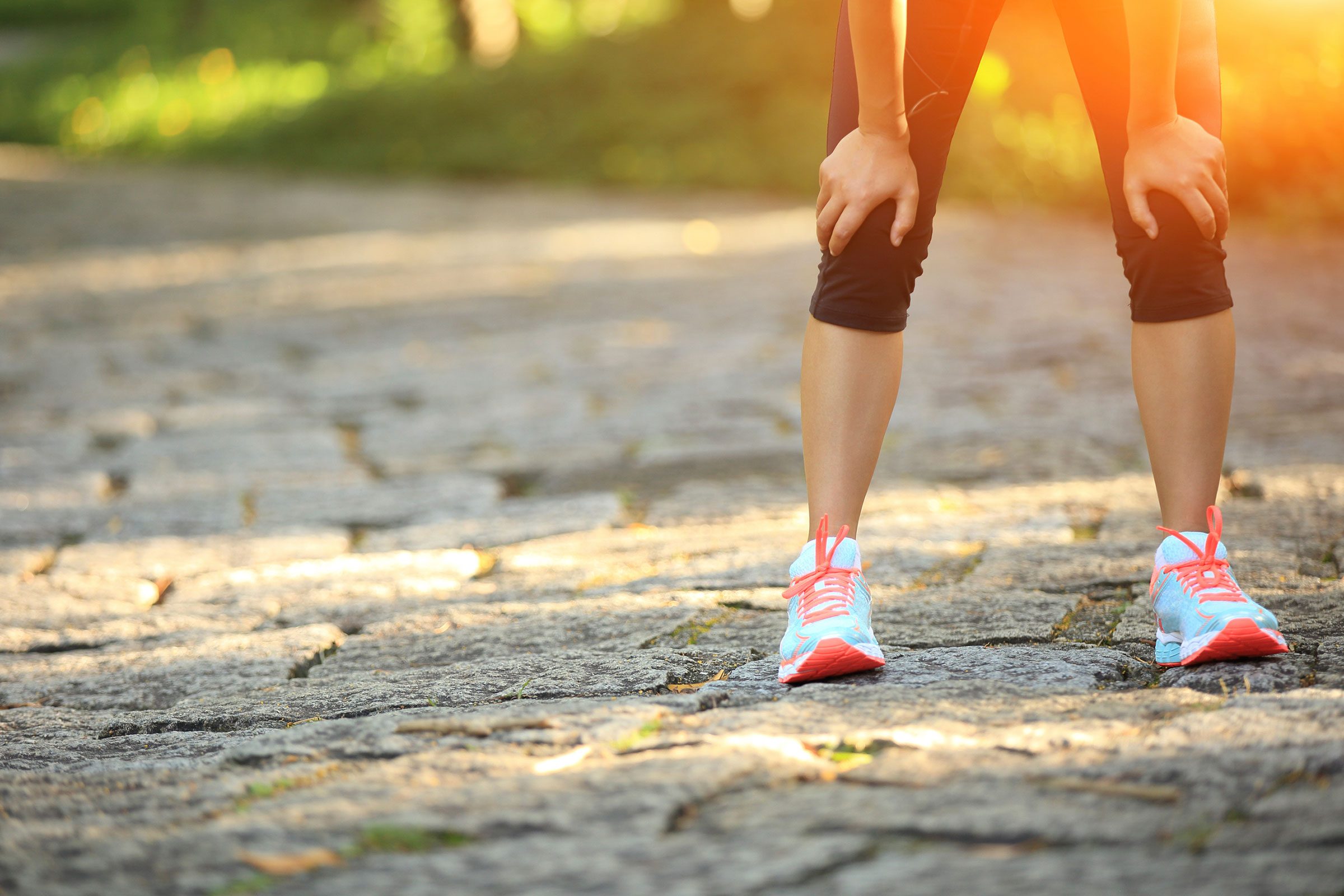
You can’t make it through a workout
You know you should exercise, but you’re just too exhausted to make it around the block much less hit a spin class. One culprit might be a lack of healthy, complex carbohydrates in your diet, says Rachel Zimmerman, RD, CNSC, CD at Indiana University Hospital at IU Health. “Carbs have gotten such a bad reputation recently but complex carbohydrates, in the form of glycogen, are the primary source of energy during exercise,” she says. “People often think they need to cut out carbs completely but when you’re working out you need to maintain a good supply of glycogen to have a good performance.” Learn the truth behind these myths about carbs.
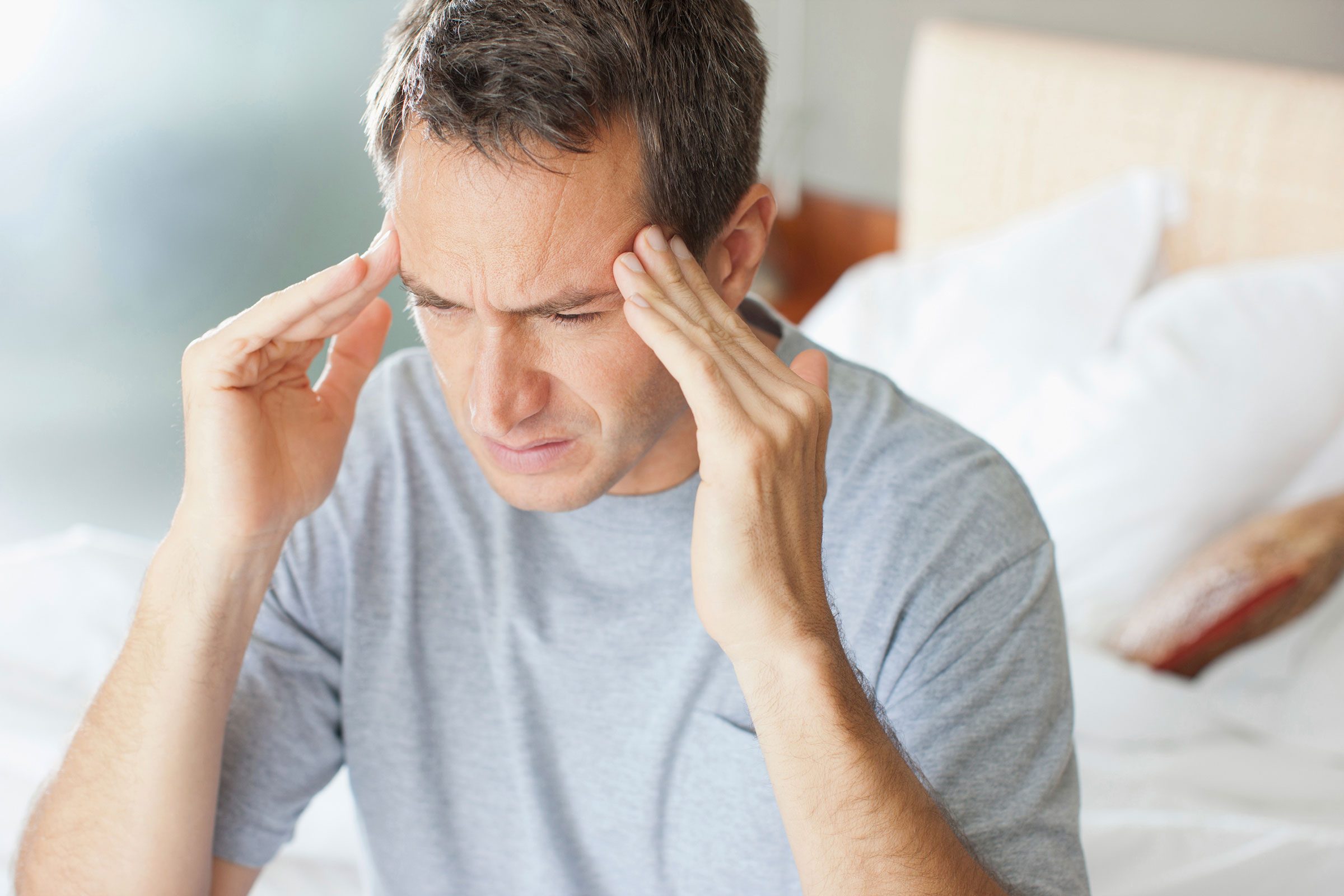
You have a headache that just won’t quit
Got a headache? Join the club: Headaches are one of the primary complaints doctors say bring patients into their office. They have many causes but if you’re plagued by recurring head pain, it’s worth checking out your diet. Recent research has linked chronic headaches to drinking alcohol and coffee, smoking, eating gluten and dairy, and even chewing gum. If you suspect a food is bothering you, try taking it out for a few days to see if your headaches improve. Here are the most common foods that cause headaches.
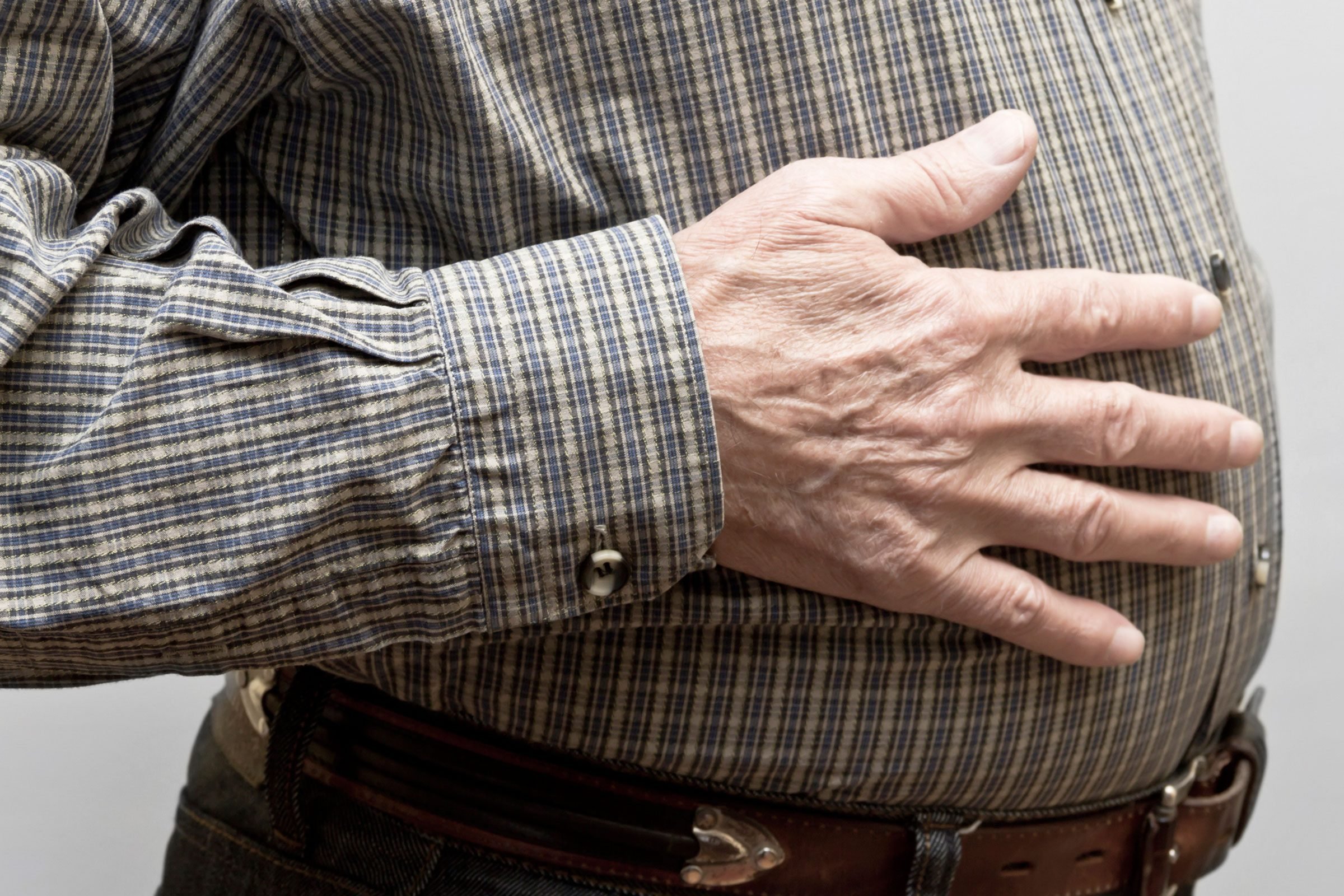
You look four months pregnant—and you’re a man
Bloating is the bane of many a person’s existence, making pants feel uncomfortably tight. But while a little gas now and then is normal, being constantly bloated may be an indication something in your diet is working against you says Sheryl Ross, MD, a women’s health expert at Providence Saint John’s Health Center in Santa Monica, California. Booze, processed foods, and salty snacks are the biggest causes of bloating she sees in her patients. “Fast foods are packed with sodium and alcohol cause the body to retain water retention,” she says. “Removing them from your diet has immediate effects within days on not only bloating but also improves blood sugar, blood pressure, weight loss, energy level, emotional stability, sleep changes, and pulse rate.” Check out the daily habits that reduce belly bloat.
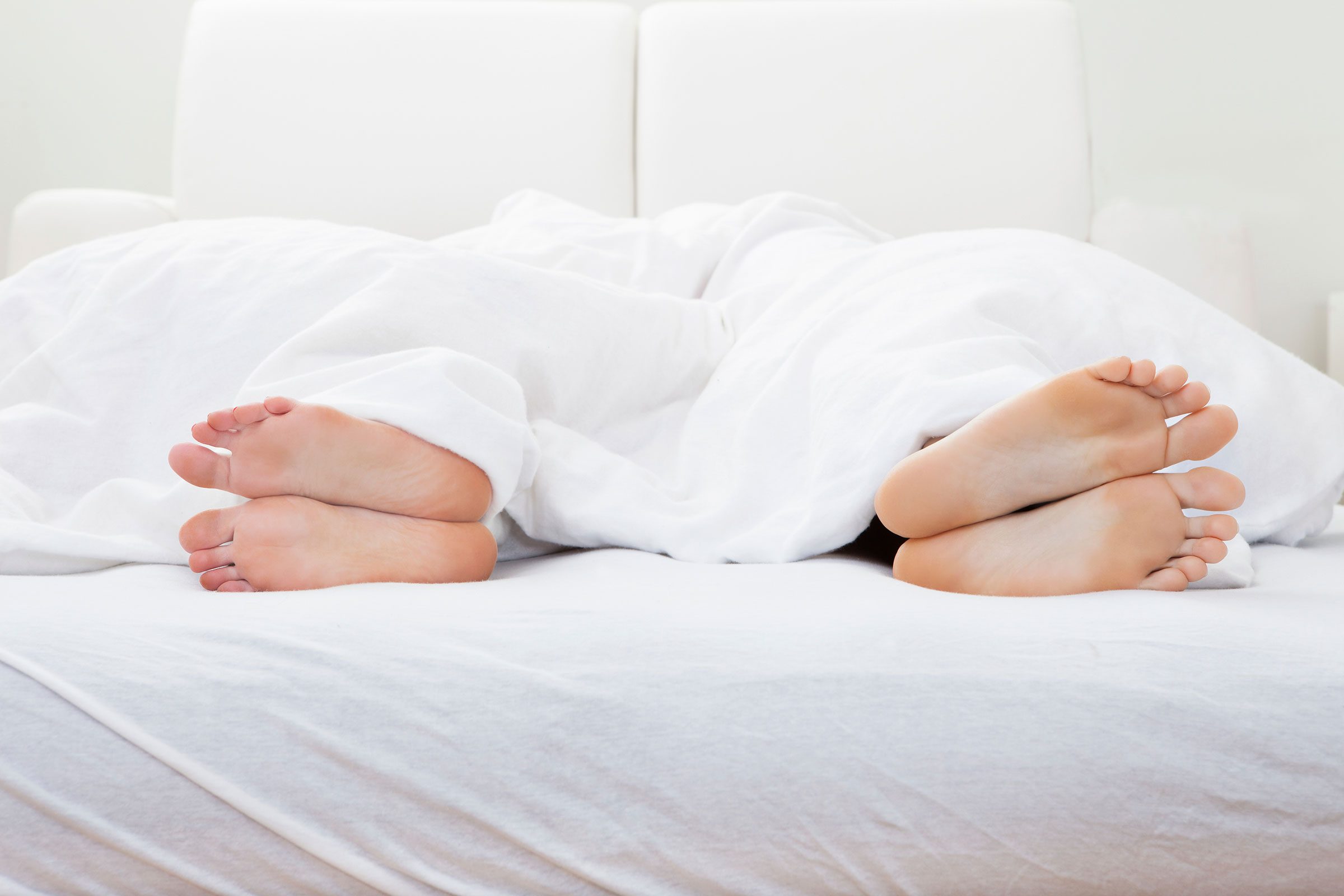
Your libido is so low it could win the limbo
Sometimes you just don’t feel like getting frisky and that’s fine but if “not tonight, honey” is becoming your personal mantra, it might be time to look for causes for your low libido. One possible culprit? That extra helping of dessert. Eating too much sugar lessens the amount of sex hormones—primarily testosterone and estrogen—you have circulating in your system, according to a study published in the Journal of Clinical Investigation. Find out how to make sex great again.

You wake up on the wrong side of the bed…daily
There’s not being a morning person and then there’s being the person who’s so grouchy and irritable in the mornings that even the dog hides. If you feel depressed, irritable, experience brain fog, or have a hard time focusing in the mornings, the problem may have more to do with what you’re eating for breakfast than the early hour you eat it at, says Sharon Collison, RD, a sports dietitian and instructor for STAR Health at the University of Delaware. “Protein helps stabilize blood sugar which helps improve satiety, mood, and concentration,” she explains. Try one of these healthy breakfast recipes to boost your energy all day long.
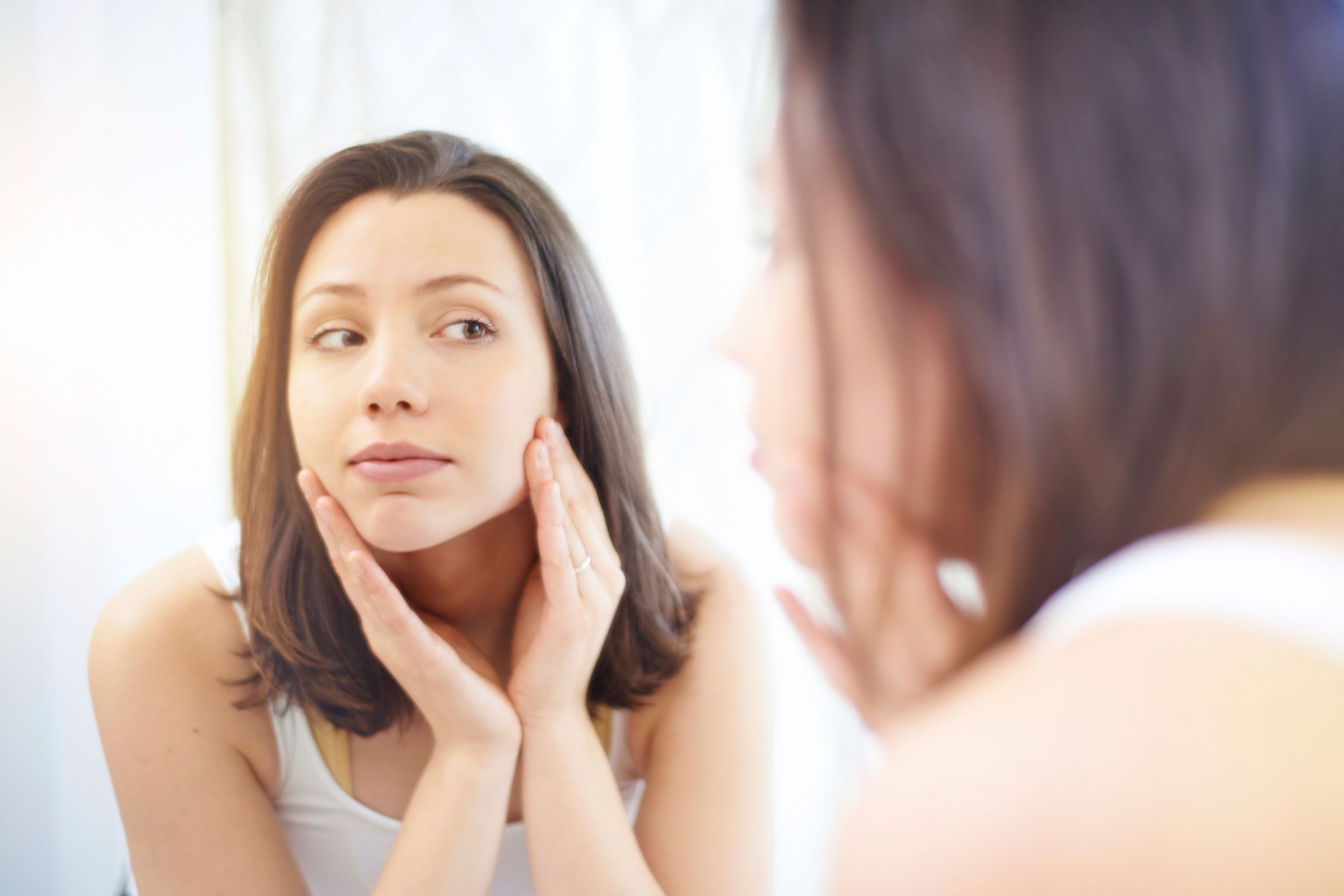
Your skin has lost its glow
Forget acne and rashes (two conditions that research has linked in some part to diet), what you eat can simply make your skin look like you’re standing under the worst fluorescent lighting regardless of where you actually are. One study, published in Evolution and Human Behaviour, found that people who ate a diet high in carotenoids, a substance found in fresh fruits and vegetables, had remarkably smoother, more glowing complexions. “The old adage ‘you are what you eat’ not only applies to our overall health but how our skin looks and feels as well,” adds the American Academy of Dermatology. Add these foods to your diet for beautiful skin.

You’re exhausted All. The. Time.
Too many of us stumble through our daily responsibilities exhausted and chronically fatigued. But you don’t have to accept this as a side effect of our modern lifestyle. Eating a diet high in processed foods, including packaged snacks and sweets, substantially increases feelings of fatigue, according to a study published in Physiology and Behavior. Add these energy-boosting foods to your diet.
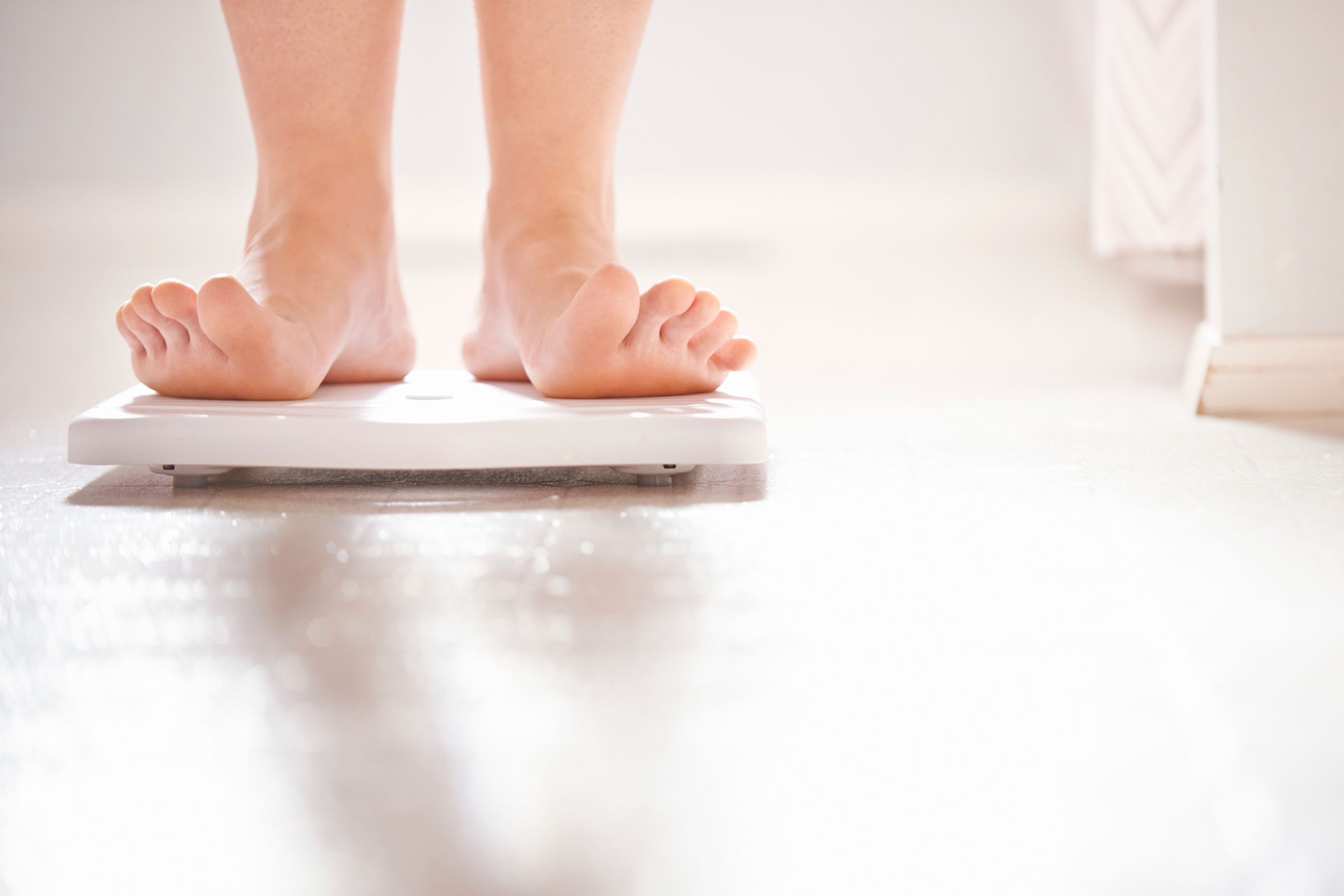
You can’t lose weight no matter how many calories you cut
It’s not just excess calories that are making you overweight, obesity may be linked to eating foods that cause inflammation in the body. Which foods? They could be different for each person, according to Judith Lukaszuk, PhD, RDN, LDN. In a paper presented at the 2016 Clinical Nutrition Conference Series she explained that when people were tested for intolerances to certain foods and then removed said foods from their diet, they lost three times more weight than people who stuck to a reduced-calorie diet that didn’t eliminate any foods.

Your joints are creakier than your staircase
Eating a diet high in processed meat, dairy, refined grains, and sweets has been linked with a higher incidence of painful joints and even arthritis, according to two studies presented at the 2015 American College of Rheumatology Annual Meeting. The researchers said the damage to knees, hips, ankles, and hands appears to come from something specific in those foods as well as from the pressure that weight gain from an unhealthy diet puts on joints. Add one of these foods that fight inflammation and pain to your daily diet.
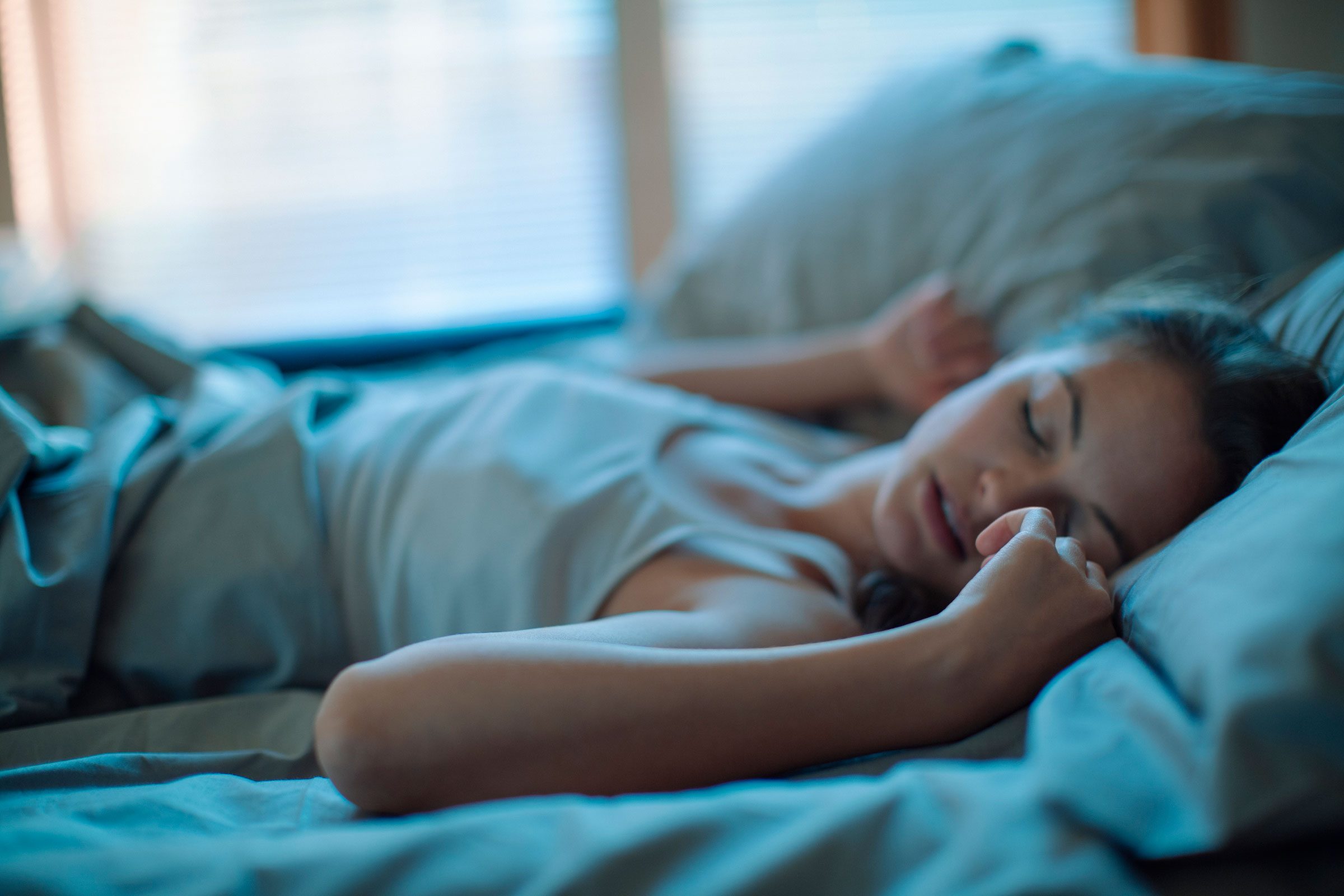
You’re sleeping like a baby (which is to say: only for a short time with frequent wakings)
If you’re too wired to sleep at night and too drowsy to function in the daytime, your insomnia might be due in part to what you’re eating. Not getting enough dietary fiber during the daytime was linked with lighter, shorter, less restorative, and more disrupted sleep in a study published in the Journal of Clinical Sleep Medicine. And a separate study from the University of Adelaide, found that eating meals high in fat not only lead to sleep problems at night but it also made people sleepy during daytime hours. Add these foods that help you sleep better to your diet to fight insomnia naturally.
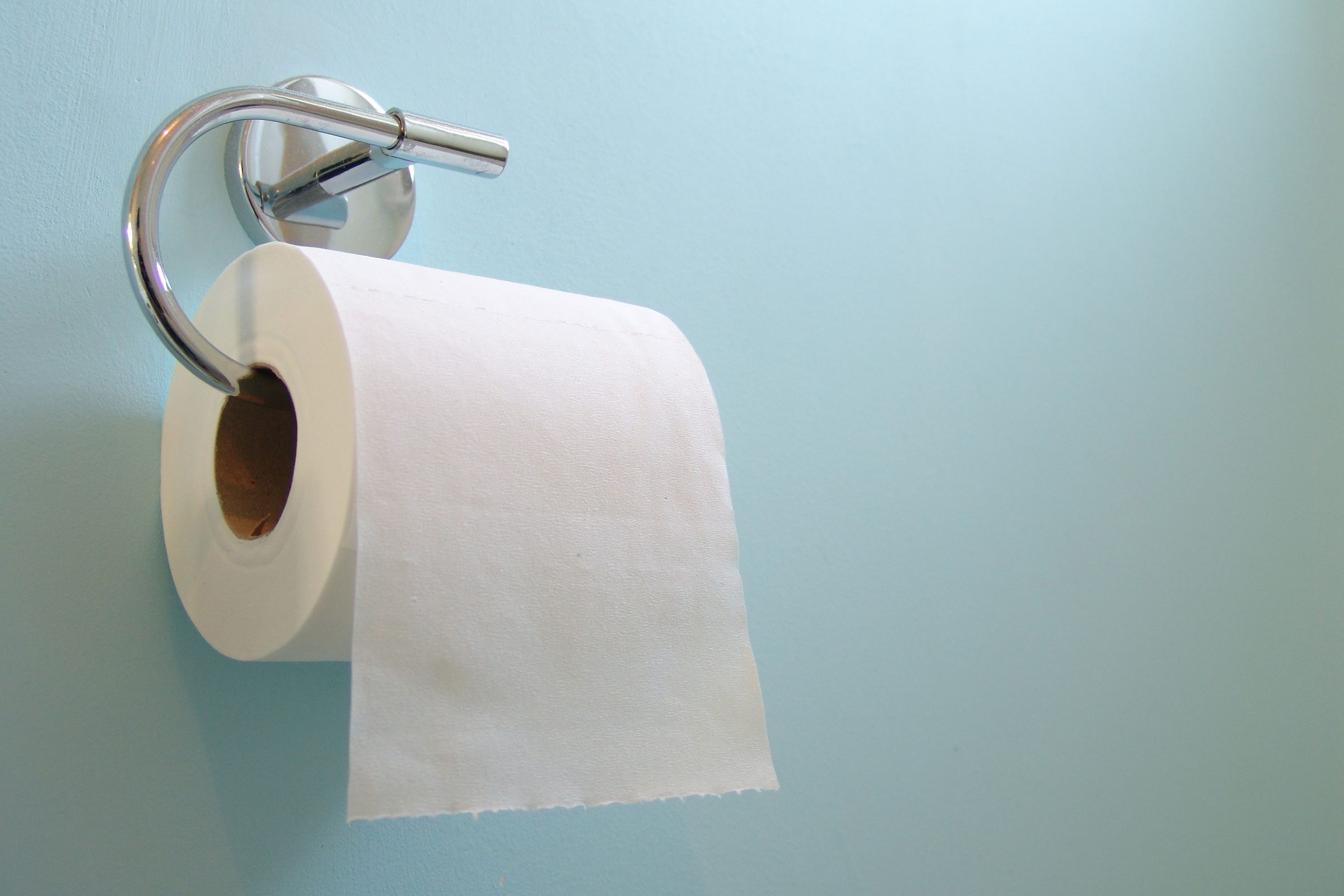
You’re constipated
“The kidneys are the filtration system for the waste our bodies produce. What goes in must come out and taxing our organs beyond the capacity for which they were designed can have major consequences,” says S. Adam Ramin, MD, urologist and medical director of Urology Cancer Specialists in Los Angeles. The biggest dietary offenders causing urinary and bowel problems in his patients? Diet soda, excess salt, red meat, fast foods and caffeine. Steer clear of these and drink plenty of plain water and you could see an immediate improvement in your toilet troubles. Avoid these foods that make constipation worse.

Your back isn’t just killing you, it’s murdering you
People with debilitating back pain will often go to great lengths to reduce it but there’s one easy fix many patients overlook — their diet, says Neel Anand, MD, clinical professor of surgery and director of spine trauma at Cedars-Sinai Spine Center. Unfortunately the sugary processed treats so many of us love are spine killers as they’re low in bone-fortifying vitamins and can even leach vital calcium stores out of them. Another factor? “Obesity, from overeating, and back pain often go hand in hand. Our spines just weren’t designed to carry around the excess weight and they often crumble—sometimes literally—under the pressure,” he says. “The good news is that losing just 15 percent of the excess weight has been shown to improve chronic back pain issues in those who are overweight. In some cases weight loss can even cancel out the need for surgery altogether.”
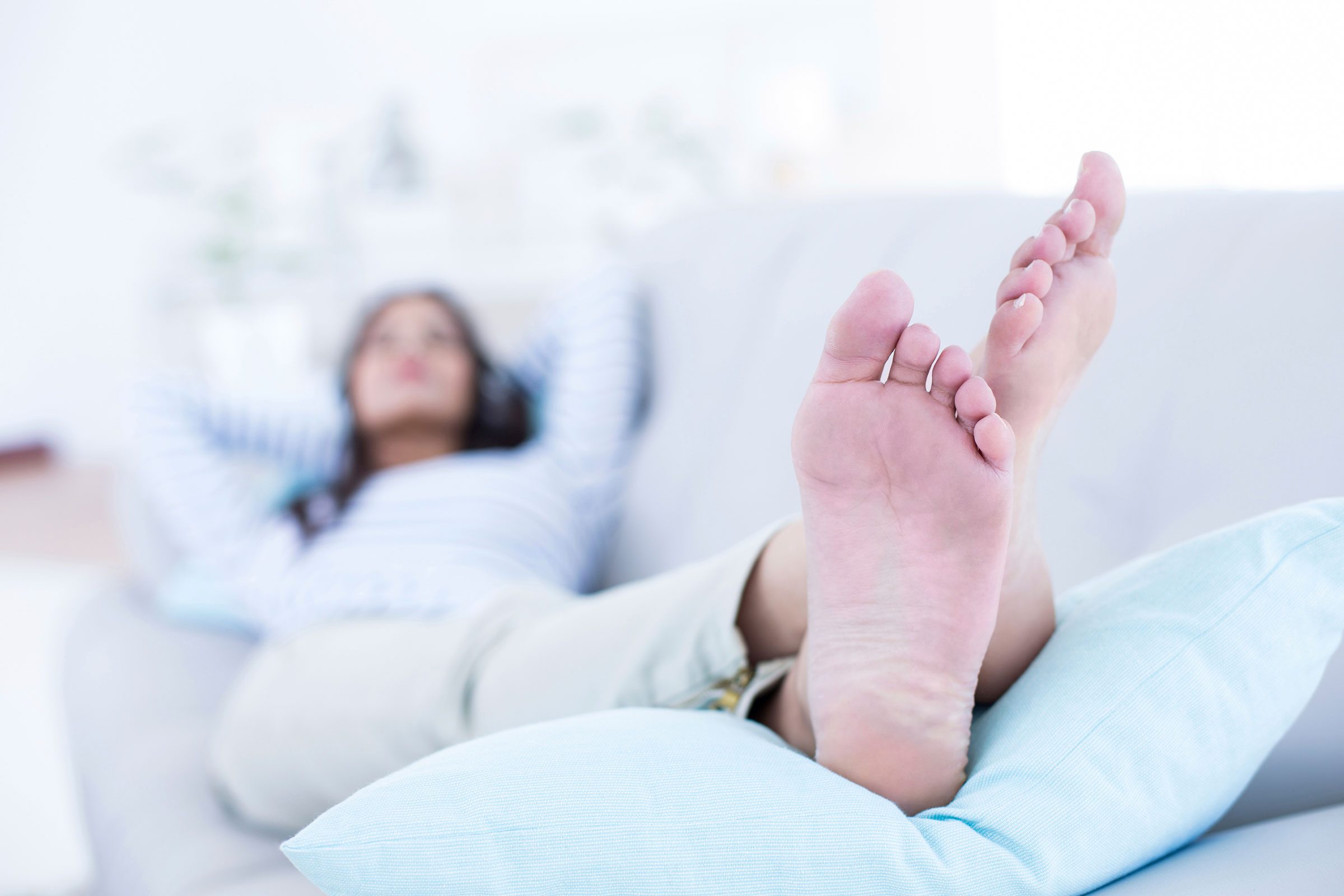
You’re tired after eating a normal meal
If you’re feeling wiped out after eating it may be a sign your food has caused a mega blood sugar crash. Over time, repeated blood sugar spikes and crashes from eating too much sugar and other simple carbs, including pasta and white bread, can lead to insulin resistance. This has consequences far beyond exhaustion, like diabetes, heart disease, and even an increased risk of cancer, explains Homayoon Sanati, MD, a medical oncologist and medical director of the MemorialCare Breast Center at Orange Coast Memorial Medical Center in California.